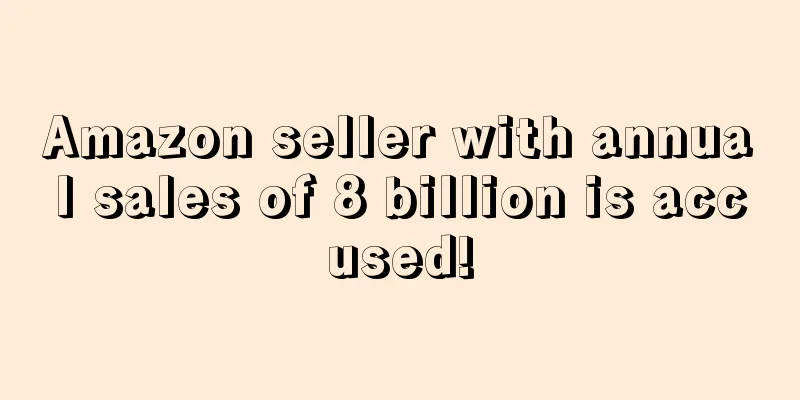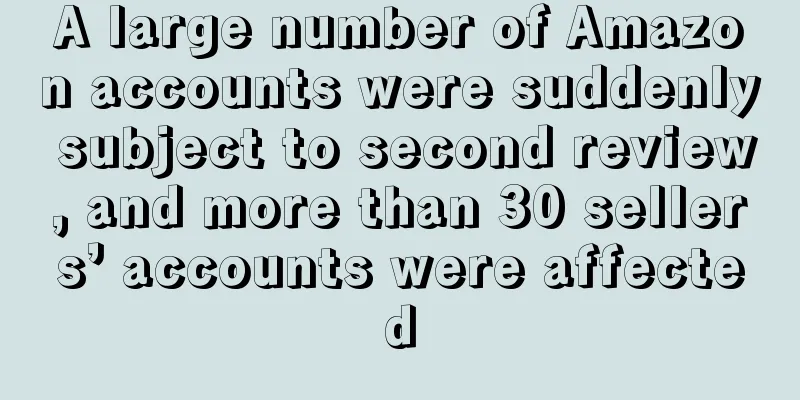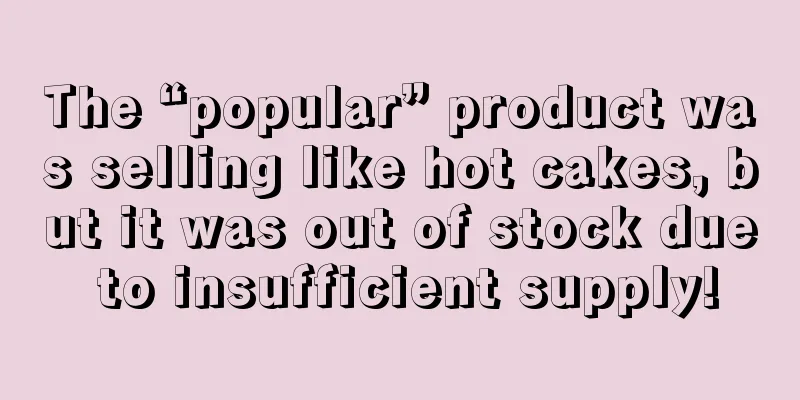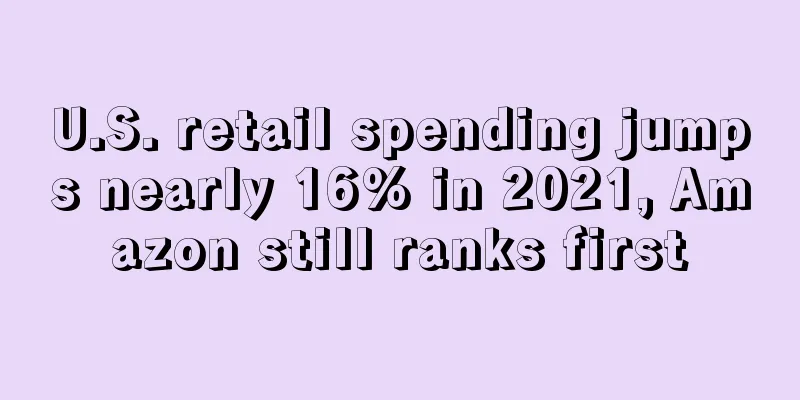Amazon seller with annual sales of 8 billion is accused!

|
When shopping on Amazon, real buyer reviews are a key factor in determining whether consumers place an order.
However, for sellers, these reviews must be compliant, and if they manipulate buyer reviews, they will face serious consequences.
1. Amazon's top seller accused of manipulating reviews
Recently, according to a report by foreign media The Washington Post, Amazon's best-selling V brand is suspected of manipulating reviews.
The media said that in order to avoid negative reviews on the store, Brand V created multiple listings for the same product, which was considered to violate Amazon's regulations as well as US consumer protection laws and anti-unfair competition laws.
An anonymous Amazon seller who has been closely tracking V Brands’ review manipulation over the past year found 1,500 cases of V Brands creating duplicate listings for the same product after the product received negative reviews. He documented these cases and then filed multiple complaints with the Federal Trade Commission and several state attorneys general.
Amazon has clear regulations prohibiting the creation of multiple detail pages for the same product. For sellers who violate the regulations, Amazon will impose different penalties depending on the severity of the case.
However, the whistleblower said that he had contacted Amazon through the Seller Center platform many times to inquire about related issues, and most of the answers he received were: "The platform has investigated the relevant issues and taken appropriate measures, but for privacy reasons, the results of the investigation cannot be shared."
In response, Amazon also issued its own statement, explaining the platform's efforts to combat fraud, but declined to comment on the allegations that V Brands manipulated reviews.
V Brands also responded to this matter . In an email to The Washington Post, V Brands said that Amazon did not investigate the company and explained that the same product listings may be deleted and then restored to reflect the latest product updates or upgrades.
It is worth noting that V Brand was also warned by the well-known overseas rating website BBB (Better Business Bureau) that the company has a complaint pattern.
Currently, the V brand is rated B- by BBB, which is a relatively low rating.
Information on the BBB website shows that many consumers complained that they found quality problems with V brand products after purchasing them, or received the wrong products. In order to protect their rights, some consumers contacted V brand company, but the company did not respond to their demands or simply refused to communicate with them.
The BBB website pointed out that the V brand may have certain problems with product quality and customer service, and consumers must be cautious when purchasing its products.
In addition to being accused of manipulating reviews, having quality issues with its products, and inadequate customer service, V Brands is also facing multiple lawsuits for copyright infringement.
In January 2020, General Wire Spring filed an intellectual property and trademark lawsuit against V Brands.
In December 2021, Motion Pro filed a patent lawsuit against V Brand.
In March 2022, Summit Tool Company filed a lawsuit against V Brand.
Being entangled in multiple lawsuits is also detrimental to the brand image of V brand and the development of the company.
As a leading brand in the tool category, V brand has outstanding market performance.
The V brand was founded in 2007 and has been focusing on cross-border overseas expansion since its inception. The company's main products are kitchen appliances, gardening necessities, outdoor equipment, automotive supplies, etc. The category matrix under the V brand penetrates multiple scenes such as front and back yards, auto repair, and residential areas. The diversified layout of more than 20,000 products has gained it more than 10 million users worldwide.
Today, the V brand has grown into a giant equipment supplier integrating production and supply chain. Its business covers more than 200 countries and regions including North America and Europe, and it also has 100 warehouses worldwide.
From the perspective of channels, V brand's self-operated platforms and third-party platforms are developing in parallel. In addition to the brand's independent website, its products are hot-selling on many mainstream platforms such as Amazon, eBay, AliExpress, Walmart, Wayfair, and Meikeduo.
Since 2017, V brand's revenue has experienced rapid growth.
In 2017, the global sales of the V brand exceeded 600 million yuan; In 2018, its global sales exceeded 900 million yuan, a year-on-year increase of 50%; In 2019, its global sales exceeded 1.7 billion yuan, a year-on-year increase of 88%; In 2020, its global sales exceeded 2.5 billion yuan, and many products ranked TOP1 on the BS list of market tools; In 2021, the brand entered the boutique 2.0 era and began to establish branches in many parts of the country. In the same year, global sales exceeded 4 billion yuan; In 2022, the company's boutique 2.0 strategy will be accelerated, and global sales are expected to exceed 8 billion yuan.
According to Jungle Scout's statistics, from January to September 15 this year, V brand's revenue on the Amazon platform alone reached US$450 million, an increase of 10.5% compared with the same period last year.
Jungle Scout said that V brand's revenue on the Amazon platform in these 9.5 months may be higher, because the estimated $450 million is based on V brand's 15,000 best-selling products (V brand has a total of 30,000 products).
However, if Amazon verifies that Brand V has manipulated customer reviews, the store will be directly affected.
Sellers will receive a policy warning email, which may result in the closure of their store if not handled immediately.
Amazon may also remove all reviews for a product and prevent the product from receiving future reviews or ratings.
If a seller violates the platform rules multiple times, the seller’s sales privileges on Amazon may be immediately and permanently revoked, the products will be permanently removed from the shelves, and the funds will be withheld.
And depending on the specific circumstances of the manipulation of customer reviews, Amazon may also take legal action, including litigation and referrals to civil and criminal law enforcement agencies.
2. Sellers should be wary of illegal comment behavior
In addition to the violations mentioned above, sellers should be vigilant and aware that the following behaviors will result in the seller's account being marked as "Violation of Buyer Review Policy".
1. Sellers use their own buyer accounts to give positive reviews to their own products or negative reviews to competitors' products.
2. The seller provides a refund or other compensation after the buyer gives a negative review of the product, and requires the buyer to change or delete the review before the refund or compensation. The seller often provides a refund or compensation by contacting the buyer on the site or using a third-party service, website or social media group.
3. Sellers find third-party service providers to provide free or discounted products to get good reviews. Or they ask them to write good reviews by providing financial rewards or other forms of compensation, and promote them on various types of websites and social media platforms, and add links to the products to attract consumers.
4. Sellers use their family, friends or employees to post reviews for their own products or competitors' products.
5. Sellers create new variations under popular products, hoping to manipulate reviews and increase the star rating of products by aggregating reviews .
6. The seller provides an external link to transfer negative reviews to a third-party website or other feedback mechanism, and then sends all positive reviews to Amazon.
7. The seller puts a small card in the product packaging or box to ask for a positive review or provide a small gift, hoping that this action will encourage the buyer to leave a positive review for the product after receiving the product.
As we all know, Amazon has always had zero tolerance for fake reviews. In order to prevent fake reviews from reaching consumers, Amazon has launched a number of lawsuits.
Amazon filed its first lawsuit against fake review brokers in 2015 and continues to pursue fraudsters through legal action.
In 2023, Amazon took legal action against more than 150 bad actors in the United States, China, and Europe who attempted to abuse reviews.
In March 2024, Amazon obtained its first judgment in a case against Auction Sentinel, a fraudulent company that facilitated false seller feedback, resulting in the website domain being transferred to Amazon.
In July 2024, Amazon filed its first joint lawsuit against review brokers with the Better Business Bureau (BBB). The lawsuit seeks to hold an illegal business called ReviewServiceUSA.com accountable for facilitating false reviews against Amazon stores, the BBB, and other legitimate companies and organizations.
In addition to the joint lawsuit with the BBB, Amazon has filed multiple lawsuits this year against fake review brokers who attempt to facilitate fake reviews on Amazon stores and other companies.
In May 2024, Amazon sued AMZ Mastery, the defendant sold fake product reviews, fake seller feedback, and other fake content to bad actors operating Amazon sales accounts in Amazon's global stores. The defendant also sold fake "helpful" votes on fake reviews to indicate that the reviews were useful for purchasing decisions. The more "helpful" votes on a review, the higher the review will be on the product listing page.
3. Amazon’s home furnishing giant was fined $3.17 million for falsifying product origins !
In addition to manipulating reviews and fake reviews, sellers should also ensure the authenticity of product information.
Because the United States attaches great importance to the protection of consumer rights, local consumer rights protection organizations and management agencies are very sound. Not only do governments at all levels have special administrative law enforcement agencies to protect consumer rights, but there are also voluntary consumer organizations to protect consumer rights, such as the American Consumers Union, the American Consumer Federation, and the American Consumer Rights Commission.
When selling goods on e-commerce platforms in the United States, in addition to paying attention to the authenticity of the advertisements, you must also protect consumers' right to know and truthfully display the product's price, origin, producer, use, performance, main ingredients and other information. Otherwise, you will be suspected of violating regulations and will face varying degrees of punishment depending on the type of violation.
Not long ago, Williams-Sonoma, a popular home furnishing brand on Amazon, was fined $3.17 million by the Federal Trade Commission (FTC) for alleged false advertising by falsifying the origin of products and labeling goods imported from China as made in the United States.
Williams-Sonoma is a high-end home furnishings retailer in the United States and a major home furnishings seller on Amazon. Its high-quality home furnishings are widely recognized by the market. However, some of its brand products are imported from China, but are labeled with the "Made in the USA" origin label. In addition, it claims to be made in the USA when promoting its products on e-commerce platforms and brand websites, directly deceiving consumers.
According to documents from the U.S. federal court, the six products investigated by Williams-Sonoma were all marked as made in the U.S., but did not disclose information about their overseas processing or the presence of foreign raw materials. One of the products was actually made entirely in China. This was suspected of violating the regulations and was fined $3.17 million.
Previously, several companies have been fined by the FTC for falsely using the "Made in the USA" label.
Tractor manufacturer Kubota North America was fined $2 million by the FTC for falsely labeling the origin of replacement parts, and American kitchen appliance brand Instant Brands was fined $130,000 for falsely using "Made in the USA".
These companies' use of the term "Made in the USA" constitutes deception and misleading to consumers and is a serious violation of regulations.
Why do so many companies take the risk of using the "Made in the USA" label?
In recent years, the US government has continued to promote "Made in the USA" and encourage local consumers to purchase and use products made in the United States.
Starting from March 2022, the US government has further upgraded its executive order on "Buy American" and even has very specific requirements. For products purchased by the government, 55% of the products must be "Made in the USA".
In October 2022, the US government raised this ratio to 60%. It even proposed that the proportion of "Made in the USA" products should reach 65% in 2024 and 75% in 2029.
The "Buy American" requirement is mainly aimed at the construction of American infrastructure, advocating that American taxpayers' money be spent on products produced in the United States to bring economic benefits to the United States, and giving priority to purchasing domestic products. There are also tax incentives for products manufactured in the United States.
Driven by the government, American people are more willing to buy "Made in the USA" products.
In order to reduce costs, many companies will choose to purchase lower-priced goods directly from overseas and label them as "Made in the USA" for sale, or purchase raw materials directly from overseas and label them as local raw materials in the United States. This behavior is a direct deception of consumers and also violates local laws and regulations in the United States.
4. Amazon was fined more than 4 million for violating regulations in the personal care products category!
Sellers should also be aware that if they illegally combine reviews or abuse variations, they will face serious consequences.
Last year, multiple media outlets revealed that Bountiful, a major seller of personal care products on Amazon, was found to have illegally merged reviews and abused variants. The U.S. Federal Commission issued a huge fine of more than 4 million yuan to the seller.
Illegal review merging refers to merging related or unrelated product reviews into the link of the new product, so that when consumers read the product reviews, they will feel that many people have placed orders, and the traffic and conversion rate will increase accordingly; abuse of variants is to use the original BestSeller products and "Amazon Choice" products to create variants, and use old products to drive the conversion rate of new products.
Notably, this is the first time in the FTC’s history that penalties have been imposed for abusing variants.
Bountiful is a leading brand in the nutrition and personal care categories on Amazon, and its products often top Amazon's best-selling lists.
It is understood that the personal care product seller used two kinds of black technology at that time. One of them is to merge variants. Many sellers have developed new products in the same way, that is, to use the original BestSeller products and Amazon Choice products to create variants, bind old links, and let the new links directly share the reviews, rankings, and star ratings of the old links to increase the conversion rate of new products. Another is to hijack the ratings and reviews of other products to increase the ratings and number of reviews of new products.
It is understood that during 2020 and 2021, this big seller used two black technologies to make many unrelated new products famous and increase sales. But it is precisely these two behaviors that have caused many sellers to fail, because Amazon has long had relevant policies: it is strictly forbidden to obtain a large number of reviews by merging variants, otherwise it will be considered as manipulating reviews.
Amazon has long taken a tough stance against violations such as merging variants. Amazon will warn sellers when it discovers such problems, and the most serious punishment is to block their accounts. However, this time the FTC intervened and issued a high fine, which means that if such problems occur again in the future, it may not be as simple as blocking the account.
5. Amazon’s new “penalty regulations” have come into effect
Not long ago, Amazon issued an announcement that the severity of its "repeat violation" policy had been upgraded.
Repeat violations refer to sellers violating the same Amazon policy repeatedly (2 or more times) within 180 days.
If the seller violates the same policy each time, the score related to the policy violation in the account status rating will increase accordingly. This means that if the seller violates the policy repeatedly, the seller's account rating will be downgraded faster. If the violation is more serious, the impact will be greater.
If a seller violates the relevant policies enough times within 180 days to reach the limit of repeated violations, he or she may face the risk of account deactivation regardless of the account health rating.
Before the account is deactivated, the seller has a 3-day grace period to resolve the repeated violations. If the seller can resolve the violations within 3 days, the account will not be deactivated and the account status rating will be updated accordingly. Otherwise, the seller's account will be deactivated until the seller successfully appeals.
During this time, Amazon’s Account Health specialists may call sellers to help resolve repeat violations.
Sellers can access the application page to get official compliance assistance from Amazon through the "Contact me now" button on the Seller Central > Performance > Account Status page.
Now that the policy has been officially implemented for nearly a month, sellers must be vigilant about two aspects:
First, if the seller has repeated violations, pay attention to the following "High-Repeat violation" warning and note that this is a risk warning before the account is blocked.
Second, sellers must join the account status protection plan. After joining the plan, if the store has any violations or receives a warning of account suspension, just click the yellow button to directly contact Amazon's account specialist and file a store complaint under the guidance of the account specialist.
In general, Amazon sellers must strictly abide by the platform's regulations and rules, avoid any illegal operations, ensure that the store operates in compliance with regulations, and avoid various risks arising from violations. Manipulating comments Amazon Sells Well |
>>: A hot-selling new brand was exposed, eyeing this track
Recommend
The “Four Little Dragons Going Global” besieged Amazon, relying on these people!
In 2023, the global economy will recover and majo...
What is Qingdao Hangmei International Logistics Co., Ltd.? Qingdao Hangmei International Logistics Co., Ltd. Review, Features
Qingdao Hangmei International Logistics Co., Ltd. ...
What is aracky? aracky Review, Features
aracky is the parent company of 4 major brands: JA...
What is LANGRIA? LANGRIA Review, Features
LANGRIA is a home decoration brand that aims to cr...
Swedish e-commerce platform My Mall sales increased by 1,200%
In other European countries, well-known e-commerc...
What is Prime Day Inc? Prime Day Inc Review, Features
Prime Day Inc was founded in the United States in ...
Revenue quadrupled in 3 years! It’s the right time for technology brands to go global
On January 30, 2024, the Brand Overseas Practice ...
Sales will exceed 36 billion U.S. dollars, and social e-commerce in the United States will still be very popular in 2021!
The rapid growth of e-commerce due to the pandemi...
Amazon's new return policy angers buyers!
As the largest e-commerce shopping platform in th...
Can’t bear it anymore! Another Amazon best seller is officially delisted
In recent years, the cross-border e-commerce indu...
What is IE Browser? IE Browser Review, Features
Jinglian Browser is an anti-association browser fo...
What is Jiji? Jiji Review, Features
Jiji is one of the most popular online platforms ...
The United States may pass a new bill requiring sellers to provide supplier information?
The Colorado State Legislature approved a new bil...
What is Intmall? Intmall Review, Features
Fengmai.com is a cross-border export e-commerce pl...
What is Frisbi? Frisbi Review, Features
<span data-docs-delta="[[20,{"gallery"...









